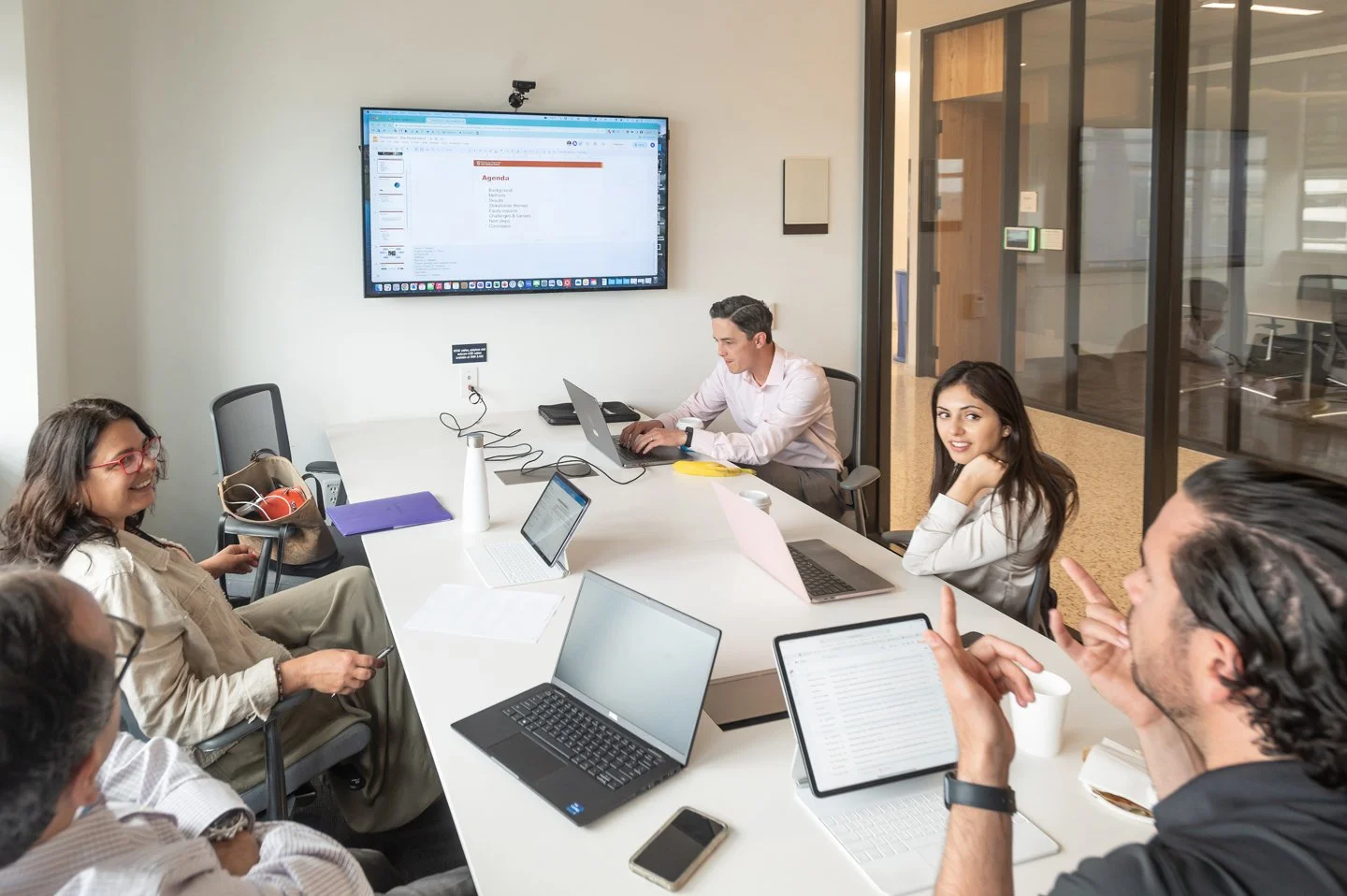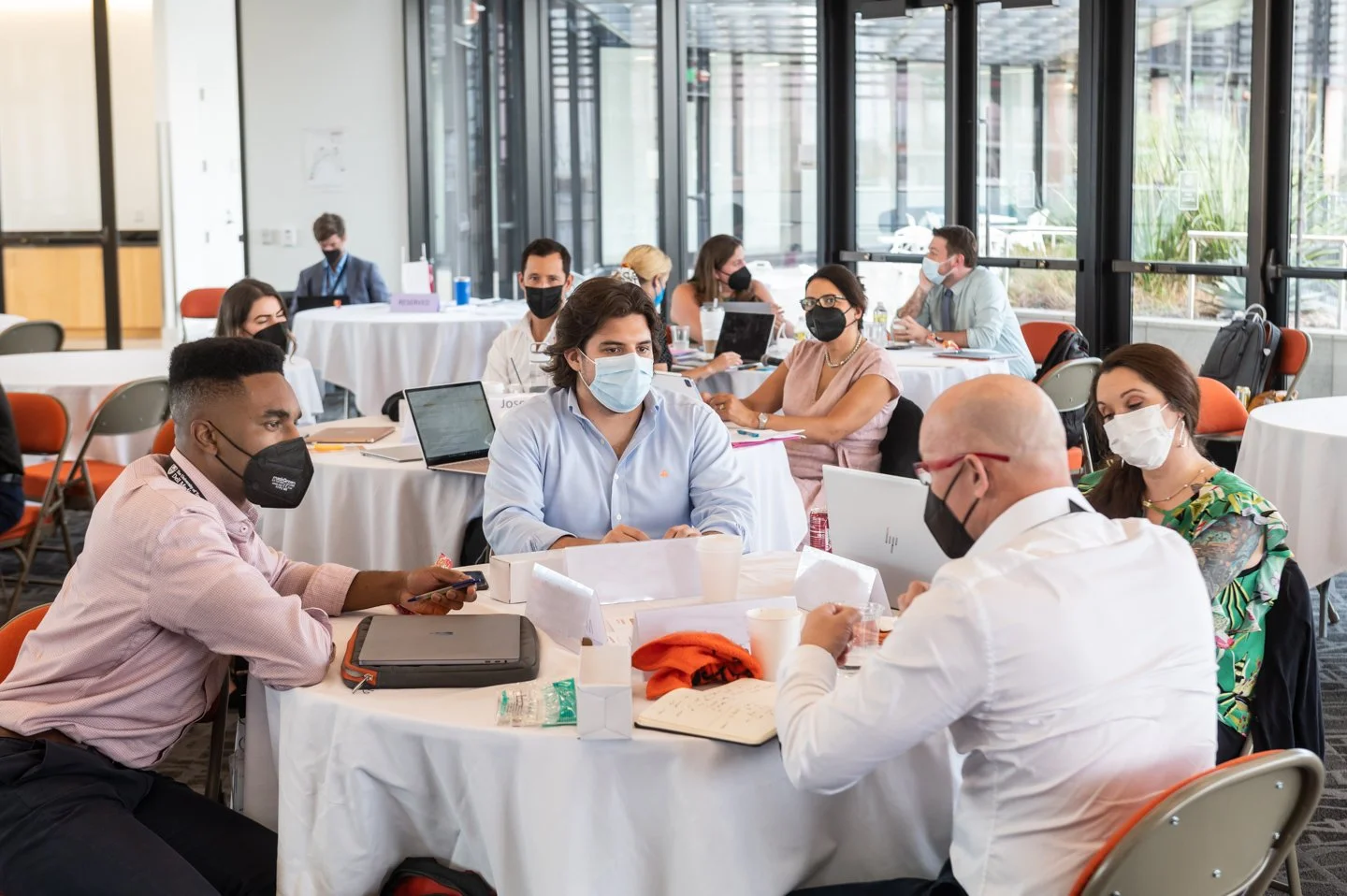Leading Value-Based Health Care Transformation
As part of the MS in Health Care Transformation curriculum (developed in 2018), all students work throughout the year on a team project to transform an aspect of health care delivery to improve value for patients. The Experiential Learning Project (ELP) extends over three semesters, building on the program curriculum as the year evolves.
Students complete background research, choose a client, create a business proposition and project “pitch,” develop measurement and analysis plans, write a final report, and present to classmates, faculty, and organizational sponsors.
Previous projects included:
Class of 2022:
-
To elucidate how clinical care can better support patients with chronic myelogenous leukemia (CML), this project aims to assess outcomes that matter most to patients, obstacles to their care, unmet needs, and gaps in care via interviews and experience groups with patients and clinicians. These outcomes, obstacles, needs, and gaps will be compared against currently existing clinical surveys used in CML care to determine
how better outcomes measures may be developed. The long-term goal is to use the findings to inform the development of clinical tools and resources for more comprehensive assessment and measurement of outcomes that matter to CML patients, as well as to construct tools and EMR functions that permit longitudinal collection and sharing of outcomes with CML patients.
-
The aim of this project is to improve the experience of cardiac surgery patients and their family support system by facilitating communication between the medical care team, patient, and family support system at a scheduled time for inpatient rounding. When faced with obstacles to family presence, a phone call or video conferencing platform will be used, allowing for consistent two-way communication in real time and on demand.
-
An adolescent-centered health clinic will improve the health of this underserved population. Providers in the clinic will be trained specifically to address the health care needs of adolescents, and the clinic space will be bright, age-appropriate, easily accessible, confidential, and community aware. By providing care specifically to this population, we can create equity by reducing barriers to health for adolescents. We can also give them a voice in their care and achieve better health outcomes.
-
We have targeted our ELP on oncology patients in the emergency department at MDA. Our goal is to improve surgical consults’ efficiency and reduce patient boarding (a boarded patient is a patient who has been admitted but is still waiting physically in the ED) and overall ED length of stay. Research has shown that holding patients in the ER leads to poor outcomes such as increased mortality and length of stay.
-
Healthcare worker “burnout” has reached a new high amid the coronavirus (COVID-19) pandemic, leaving an already taxed health care system in the United States with fewer resources, as well as perpetuating physician and staff shortages. The fact that 8% of doctors in the United States permanently closed their offices between March and July of 2020, leading to 16,000 fewer practices and physicians available for care, is a powerful illustration of the impact of burnout on patient care. Moreover, burnout has led to colloquial and clinical depression and mental health issues among these workers, such as suicidal ideation or substance use disorders.
The Grit to Growth team believes that healthcare staff and clinicians in rural and underserved areas are critical to the health and wellbeing of the populations they serve. MFHC is a Rural Health Center (RHC) located in northwestern Colorado and serves a community of 2500 people. Our team will test and implement strategies to reduce burnout among clinicians and staff at MFHC.
-
CarePartners aims to achieve better health outcomes by increasing usage of prenatal care and therefore reducing preterm births and low birth weights, and improving hospital outcomes and patient and provider experiences. Our team will work with CarePartners to evaluate their program for patients enrolled in the Intensive Care Pathway based on outcomes that matter most to pregnant women. From our qualitative research and evaluation of the program, we will give recommendations to CommUnityCare on ways they can adapt their CarePartners program to better reach their patient’s desired outcomes.
-
We aspire to understand what outcomes are important to patients with chronic inflammatory demyelinating polyneuropathy (CIDP) and gain a shared understanding of aspects of their lives affected by their condition to optimize shared decision making. By doing so, we hope to optimize treatment by ensuring that patients who remain on IVIg (and other treatments) are truly responding. This may reduce the number of patients being unnecessarily treated with IVIg and other immunosuppressive therapies, and avoid potentially serious side effects, while allowing alternative therapies to be explored.
-
The Back to Value team aspires to understand what outcomes are important to our patients by conducting qualitative research and Experience Group sessions, looking at what outcome measures are available in the literature, and assessing how they correlate with each other. We will start with patients with spinal degenerative pathology that have had a single lumbar decompression and fusion procedure (including a transforaminal interbody fusion) . We would like to measure these patients’ outcomes within our practices--both private practice and a military hospital--in South Africa. We also hope to find if there is a relationship between the qualitative data and quantitative data that may already exist. After understanding the outcomes that matter to this group of patients, we aim to collaborate with the South African Spine Society with the goal of incorporating our identified outcomes into the spine registry the South African Spine Society plans to create.
Class of 2021:
-
The critical question this project aimed to answer is how musculoskeletal clinicians and patients can feel more comfort and calm during telehealth examinations and throughout the treatment process. This project provided a guide to improve rapport between patients and clinicians when using telehealth. This guide incorporated both peer-reviewed research and patient and clinician feedback.
-
The city of Austin, Texas currently has over 3000 people who are experiencing homelessness, and over 100 organizations dedicated to supporting the needs of this population. Unfortunately, these organizations are mostly siloed, providing services to small groups of people, instead of working together to ensure maximum access to their services. The fragmentation of resources within the current system makes it difficult for people experiencing homelessness to consistently access social services, which has a significant impact on health and overall well-being. This project’s goal was to reduce the fragmentation of services to improve coordination of resources, and in turn, remove barriers to access of social and medical services.
-
This project team aspired to improve health outcomes for patients living with tuberous sclerosis complex (TSC) served by the Dell Med and/or Ascension community as these entities contemplate a new TSC clinic. The nature of TSC often requires care from many different specialists and carries large social, emotional, and environmental factors that can go unmet with traditional care delivery. Although there is a large body of evidence related to TSC clinical care delivery, there is a paucity of information about the outcomes that matter most to patients. Using the capability, comfort, and calm framework, the ELP Team illuminated the patient’s voice through Experience Group methodology.
-
Pancreatic cancer afflicts approximately 60,550 people annually in the U.S. and is associated with a 9% five-year survival rate. Although there has been improvement in survival rates, pancreatic cancer remains one of the most lethal human cancers, and very little has been published on the outcomes that matter to these patients. Symptom burden is significant and includes depression, fatigue, weight loss, digestive issues, and intractable pain. Given the limited effectiveness of treatment, goals of care must focus on symptom management and what matters most to patients. This pilot evaluation helped create a framework in which patient experience and outcomes that matter most to people living with advanced pancreatic cancer are identified and elevated as core components of the treatment plan. The project’s primary objective was to qualitatively assess what matters most to people living with advanced pancreatic cancer and how intervention may achieve the 3 Cs (capability, comfort & calm). To achieve their objective, they evaluated patients from the Dell LiveStrong Cancer Center (LCI) UT Health Austin, Dell Medical School; Dell Seton Medical Center UT Austin, TX; and patients from the MD Anderson Cancer Center (MDACC) in Houston, TX.
-
Provider burnout has been a concern long before the pandemic. Using Experience Group research, interviews, and qualitative analysis, the TRUE GRIT team identified factors contributing to resiliency, the drivers of burnout, and the unmet needs of nurses and physicians practicing on the front lines of a frontier health care system in Grand County, Colorado.
-
Evidence demonstrates the importance of family engagement as an intervention for treating obesity and indicates the importance of starting during childhood to avoid the persistence of obesity into adulthood. The factors influencing childhood obesity include parent weight status, home nutritional environment, nutritional knowledge, parenting style, and the encouragement of activity. With or without extensive community factors, the strong evidence of the importance of the child and family connection in addressing the chronic condition of obesity leads the MILES team to develop a program that is sensitive to the challenges of changing food habits and will achieve a lower overall BMI for a household.
-
The Riverside project team plans to design and provide implementation plans for health care services tailored to specific communities. While the methodology shows this project is generalizable and scalable, their focus is on Riverside Hospital in the Third Ward of Houston.
-
The goal of this project is to transform hip and knee arthroplasty in South Africa with the use of same-calendar-day discharge in an ambulatory surgical centre (ASC) and by measuring the outcomes that matter most to patients. Our implementation of this discharge process and measurement of outcomes is a disruption to the current fragmented care and unsustainable funding system.
-
This report provides information and guidance to the Behavioral Health Clinical Community (BHCC) of the Military Health System to help clinicians optimize treatment outcomes for patients with posttraumatic stress disorder (PTSD). A literature review highlights the polytrauma triad, a patient segment with co-occurring PTSD, traumatic brain injury, and chronic pain who may have different outcome trajectories and treatment needs. In addition, the report includes a summary of the literature on the impact of client factors and treatment effects that impact treatment outcomes for PTSD and recommendations for data to help clinicians develop and refine the course of care. In addition, interviews with ten stakeholders with connections to military behavioral health care are included. Additionally, an equity analysis provides the BHCC with information on how to ensure equitable care. Finally, a synthesis of these findings, including recommendations for what information and data could help clinicians with initial treatment planning, signal when patients are not recovering as quickly as expected and provide data-informed course corrections in care.
Class of 2020:
-
The AFib PROMS ELP seeks to explore current validated patient-reported outcomes pertaining to atrial fibrillation (AFib) treatment and identify the comprehensive needs and respective measures of patients post AFib ablation. Although COVID-19 delayed the execution of qualitative research, the project uncovered another gap in current research: the need for the validation of electronic versions of current measures to be administered remotely.
-
Patients who attend residential addiction treatment and transition back to their home environments often do not experience optimal outcomes and sustained recovery. This project aims to evaluate treatment delivery and gaps in care by interviewing patients about their experiences, discussing what outcomes matter most to them, and creating feasible solutions while including those patients in the feedback loop.
-
Description text goes A.D.A.P.T. is a Mobile Direct Primary Care model that provides access to cost-effective quality care at the convenience of your workplace. Patient-centered care where you need it, when you need it.
-
Expansion of the UT MD Anderson Cancer Center (MDACC) brand / care model into UT system hospitals has been proposed as a strategy to increase patient access to state-of-the-art, multidisciplinary cancer care across the state of Texas, and attract new patients into the realm of UT health care. The UTC3 collaborative project explores perceptions of how this relationship is working in the collaborative interface between MDACC and UTMB.
-
This project is focused on assisting veterans who were discharged from Center for the Intrepid (CFI) and are reintegrating back to their communities by connecting them with services and supports that can provide a solution to possible health care access challenges, mental health issues, and the effects of social isolation. Their platform will help to extend the care cycle in an integrated approach, using FHIR to promote interoperability by aggregating patient data from ALHTA, CFI and MyHealthEVet, and leveraging artificial intelligence and machine learning to direct patients to community resources centered on the needs of the veterans. This will provide value-based outcomes that matter most to these patients and their families.
-
Project Headwaters is a primary care IPU-based team model that co-locates important community services, such as medical services, education programs, a senior center, a community kitchen and a farm.
-
This project aims to design an integrated, informative, relational, multidisciplinary maternal and infant care model that spans the entire care continuum from conception through the first year postpartum, with the goal of delivering individualized, high-value care to patients. Ultimately, the work to develop the Mother-Baby IPU will drive value-creation for babies and their families. It will create an environment that allows both patients and providers to feel supported and united as they work to deliver all the care that moms and babies need to achieve not just health, but wellness.
-
This project is designed to gain insights into the changing dietary, exercise, and family connection behaviors that affected the overall health of individuals and families while restricted to home during a pandemic. This team developed a 20-question survey, which included questions on changes in eating habits, activity levels, and screen time.
-
The Rare Tumor Telehealth Consortium will leverage telehealth services to virtually connect rare tumor patients with rare tumor academic oncology experts at MD Anderson Cancer Center.





